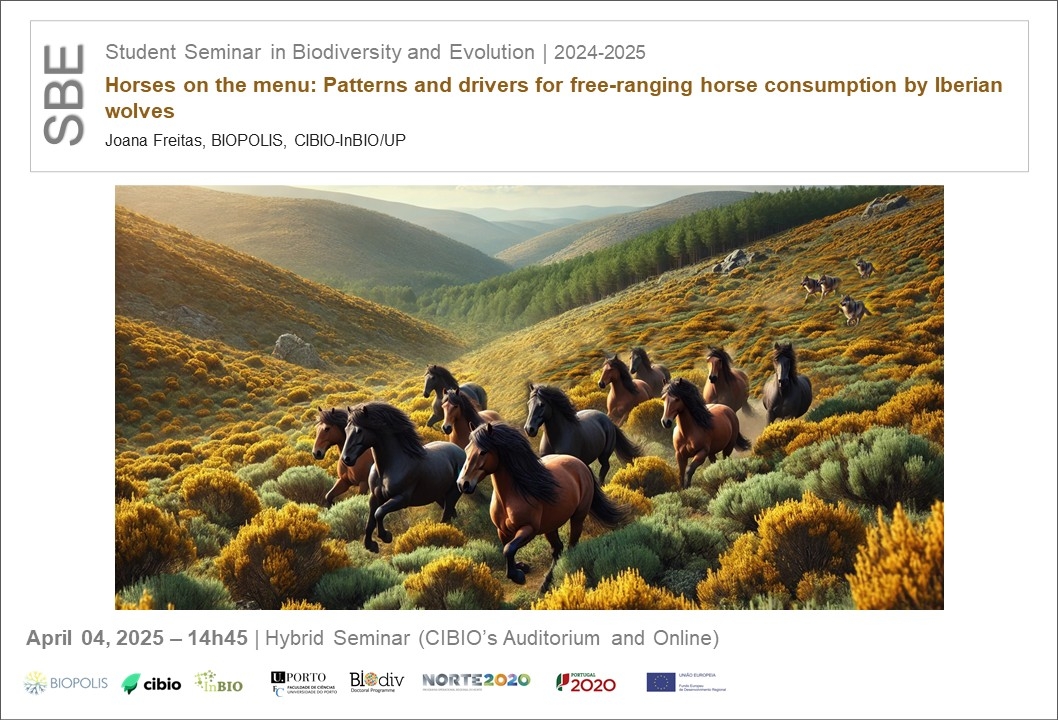Horses on the menu: Patterns and drivers for free-ranging horse consumption by Iberian wolves
04 Apr 2025 - Joana Freitas, BIOPOLIS, CIBIO-InBIO/UP | 14h45 | Hybrid Seminar

STUDENT SEMINAR IN BIODIVERSITY AND EVOLUTION
[Host: Francisco Álvares, Conservation Genetics and Wildlife Management - CONGEN]
Zoom Link: https://videoconf-colibri.zoom.us/j/99764286136
In few areas worldwide, horses are a regular wolf prey and comprise the majority of wolf diet. This is the case in northern Iberian Peninsula, where wolves positively select autochthonous breeds of mountain ponies, which are free-ranging but have owners, leading to severe conflicts. Yet, patterns and drivers related to wolf consumption of free-ranging mountain ponies are poorly characterized. We conducted a systematic literature review on diet of Iberian wolves with three main goals: 1) assess general patterns of wolf diet in areas with or without free-ranging ponies, including geographic distribution, prey consumption (%FO), and seasonal variation; 2) investigate how consumption of free-ranging horses affects consumption of other prey species by wolves; and 3) identify key drivers influencing consumption of free-ranging horses by wolves, in relation to several ecological variables (e.g., altitude, vegetation cover, wolf density, human population density and magnitude of consumption of other prey species). From a systematic literature review were retrieved 37 publications, comprising 137 annual studies and 104 study sites. The results revealed that horses were the third (n=98 studies; 71.5%) most frequently consumed prey by wolves in the Iberian Peninsula, but, in areas with free-ranging horse populations, this species comprised the highest mean frequency of occurrence (FO) in wolf diet (40.5%). Moreover, free-ranging horses were more consumed than domestic ungulates when wolf packs were smaller and the diversity of domestic prey species was lower. On the other hand, free-ranging horses were more consumed than wild ungulates, specifically roe deer and wild boar, when wolf packs were larger and when human population density was higher. Our main findings highlight the important ecological role of free-ranging horses as a wolf prey, with crucial implications for livestock management as horses could act as a potential buffer to reduce predation on economically valuable livestock species, such as cattle.
Joana Freitas is a PhD student in the CONGEN group at BIOPOLIS-CIBIO. Her project focuses on assessing the ecosystem services and disservices provided by the endangered Garrano pony. The main goal is to quantify the ecological and sociocultural contributions of free-ranging Garranos, in order to understand the potential of free-ranging livestock breeds in terms of their ecological, sociocultural, and economic value to people.
[Host: Francisco Álvares, Conservation Genetics and Wildlife Management - CONGEN]
Zoom Link: https://videoconf-colibri.zoom.us/j/99764286136